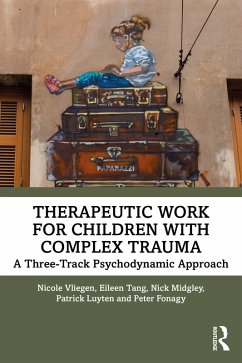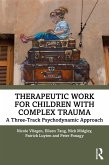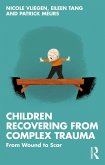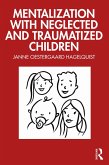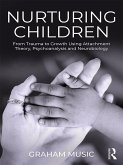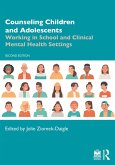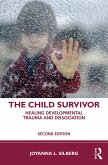The book provides a contemporary and comprehensive approach to working with traumatised children by integrating knowledge and skills from traditional psychodynamic child psychotherapy and more contemporary trauma-informed and mentalization-based frameworks. It advocates three tracks of work, involving direct work with the child, work with the child's primary caregivers and work with the network. The book is divided into two parts: Part I of the book covers the theoretical background and Part II discusses the core components and phases of the trauma-informed and mentalization-based treatment approach. The authors bring out the specific dynamics of the psychotherapeutic work through four composite cases woven through the book.
Written in accessible language this treatment guide is primarily aimed at psychodynamically trained psychotherapists, mental health professionals and professional caregivers working with traumatised children.
Dieser Download kann aus rechtlichen Gründen nur mit Rechnungsadresse in A, B, BG, CY, CZ, D, DK, EW, E, FIN, F, GR, HR, H, IRL, I, LT, L, LR, M, NL, PL, P, R, S, SLO, SK ausgeliefert werden.
"The present volume is much needed as communities around the world face more strife and conflict and complex trauma in children is increasingly common. The authors offer a concise and invaluable integration of clinical theory with insights into how therapists create a safe space to facilitate children's recovery and growth. In language accessible for students as well as parents, the authors provide a vivid portrait behind the scenes of experienced therapists working with great skill with traumatized children and their families." - Linda Mayes, Arnold Gesell Professor Child Psychiatry, Pediatrics, and Psychiatry, Yale Child Study Center, Yale School of Medicine.
"Child psychotherapists working in the psychodynamic tradition have always worked with children and families struggling with the effects of complex trauma. Yet there has been a lack of an integration of longstanding psychoanalytic clinical experience with contemporary ways of working with trauma emerging from other fields, including neuroscience, developmental psychology and mentalization-based work. Nicole Vliegen and her colleagues have produced an approachable and inspiring practice guide, which will be useful for any child psychotherapist working with traumatised fostered and adopted children. Especially useful is the three-track treatment approach: direct therapy with the child has to be combined with active work with the parents/carers and the wider network for the work to have a lasting impact." - Maria Papadima, PhD, Editor of the Journal of Child Psychotherapy; Senior Child and Adolescent Psychotherapist in the NHS Service for Adolescents and Families in Enfield (SAFE)

